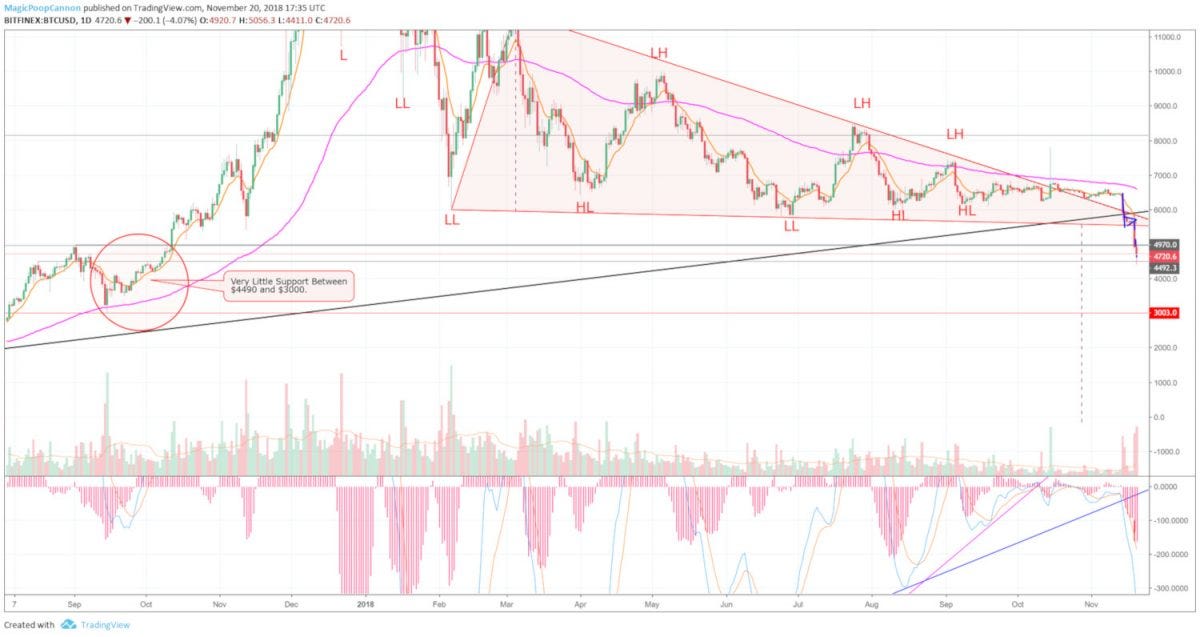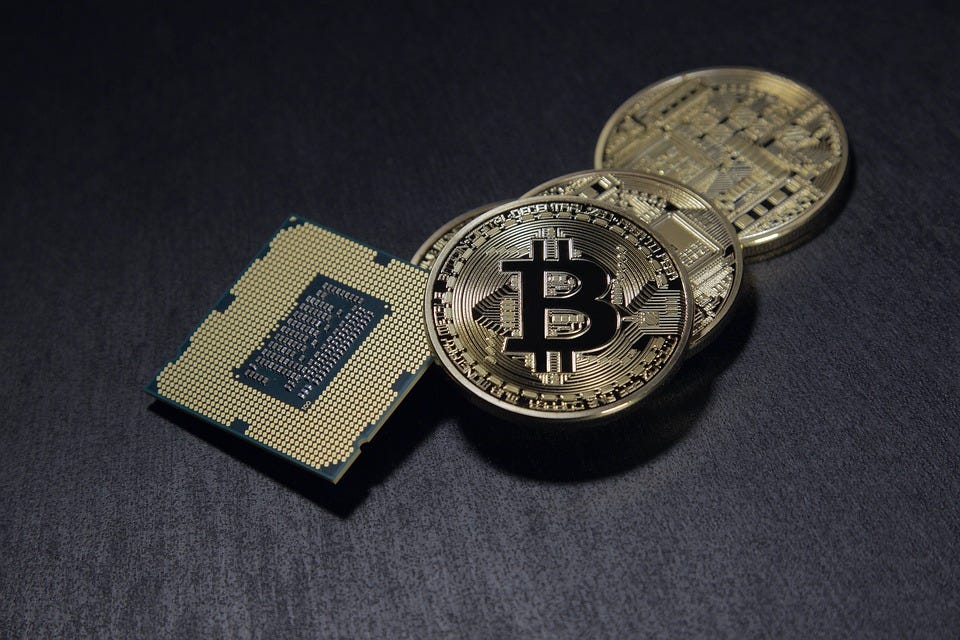Is Cryptocurrency on the verge of going mainstream as traditional investors look to embrace the new kid on the block
During the bull run of 2017/18, coins could pump 50% on little more than a tweet of a conference announcement or a trivial code release. The principles of decentralisation and innovation were king and governments, financial services and regulation of any kind the public enemy of this bright new decentralised future. But after the parabolic rise of 2017 and the sharp sell-off of 2018 investor sentiment has reversed dramatically in the hope that these same institutions can restore their fortunes.
Hopes of greater institutional participation have largely hinged on the prospect of a Bitcoin ETF (Exchange Traded Fund) which would allow private and institutional investors to participate in the market without the risks of holding Bitcoin directly. A good comparison is the well-established GLD ETF that provides exposure to gold without holding it under the mattress. However, this approach has so far proved disappointing due to rejections and delays by the US Securities and Exchange Committee (SEC).
Bakkt is the latest ambitious offering to attempt to fill this gap. As a subsidiary of Intercontinental Exchanges (owner of New York Stock Exchange), Bakkt will have immediate access to the considerable resources and existing futures infrastructure of its parent company giving it a distinct advantage over crypto only platforms.
“Bakkt is designed to enable consumers and institutions to seamlessly buy, sell, store and spend digital assets. Formed with the purpose of bringing trust, efficiency and commerce to digital assets, Bakkt seeks to develop open technology to connect existing market and merchant infrastructure to the blockchain.”
Bakkt will initially provide one day settled futures contracts where participants can make a purchase of Bitcoin during operating hours which is then delivered after market close. Alongside this, Bakkt will provide a secure and fully insured Bitcoin warehousing product eliminating the risks posed to investors directly holding the asset.
Working with a cabal of venture capitalists and hedge funds to provide initial liquidity Bakkt has also partnered with Microsoft, Boston Consulting Group (BCG) and Starbucks to bring technical and retail insights to the business. Microsoft’s Azure cloud system will be used to provide the underlying IT infrastructure, while the hook-up with Starbucks is a clear nod in the direction of planned merchant integration to make Bitcoin purchases more viable in future.

As well as addressing concerns over regulation and security for the first time Bakkt will provide the level of liquidity big players are interested in. Bakkt will deal initially only in Bitcoin and has designs on an ETF of its own that may carry more weight with the SEC than previous efforts.
It is worth bearing in mind though that institutional money is not always the panacea enthusiasts hope it to be. For example, the first futures contracts on Bitcoin towards the end of 2017 preceded an immediate and fairly severe decline in the price of Bitcoin by January 2018.
Bakkt, however, should be less problematic in this regard as their futures offering is settled for “physical” Bitcoin at the end of the trading session, unlike current derivative futures offerings acting as a purely paper claim against price changes of the underlying asset. This should increase the demand for Bitcoin while diminishing opportunities to speculate against it.

A Bitcoin price rally in the run-up to the launch of Bakkt is still possible but market response to what should be a watermark development has thus far been muted, with the bear market continuing unabated. Against a backdrop of one of the worst crypto bloodbaths seen thus far (Bitcoin has shed 30% of its value in the last seven days), it is perhaps unsurprising that Bakkt CEO Kelly Loeffler has decided to postpone the initials December launch date till January 24th 2019.
Although no one knows what the immediate future holds for the price of Bitcoin the presence of big players like Bakkt and others suggest that some still see a bright future. Longer-term, Bakkt will add a great deal of credibility to this nascent asset class and expand the possibility of new investment from previously untapped sources.
During the bull run of 2017/18, coins could pump 50% on little more than a tweet of a conference announcement or a trivial code release. The principles of decentralisation and innovation were king and governments, financial services and regulation of any kind the public enemy of this bright new decentralised future. But after the parabolic rise of 2017 and the sharp sell-off of 2018 investor sentiment has reversed dramatically in the hope that these same institutions can restore their fortunes.
Hopes of greater institutional participation have largely hinged on the prospect of a Bitcoin ETF (Exchange Traded Fund) which would allow private and institutional investors to participate in the market without the risks of holding Bitcoin directly. A good comparison is the well-established GLD ETF that provides exposure to gold without holding it under the mattress. However, this approach has so far proved disappointing due to rejections and delays by the US Securities and Exchange Committee (SEC).
Bakkt is the latest ambitious offering to attempt to fill this gap. As a subsidiary of Intercontinental Exchanges (owner of New York Stock Exchange), Bakkt will have immediate access to the considerable resources and existing futures infrastructure of its parent company giving it a distinct advantage over crypto only platforms.
“Bakkt is designed to enable consumers and institutions to seamlessly buy, sell, store and spend digital assets. Formed with the purpose of bringing trust, efficiency and commerce to digital assets, Bakkt seeks to develop open technology to connect existing market and merchant infrastructure to the blockchain.”
Bakkt will initially provide one day settled futures contracts where participants can make a purchase of Bitcoin during operating hours which is then delivered after market close. Alongside this, Bakkt will provide a secure and fully insured Bitcoin warehousing product eliminating the risks posed to investors directly holding the asset.
Working with a cabal of venture capitalists and hedge funds to provide initial liquidity Bakkt has also partnered with Microsoft, Boston Consulting Group (BCG) and Starbucks to bring technical and retail insights to the business. Microsoft’s Azure cloud system will be used to provide the underlying IT infrastructure, while the hook-up with Starbucks is a clear nod in the direction of planned merchant integration to make Bitcoin purchases more viable in future.

As well as addressing concerns over regulation and security for the first time Bakkt will provide the level of liquidity big players are interested in. Bakkt will deal initially only in Bitcoin and has designs on an ETF of its own that may carry more weight with the SEC than previous efforts.
It is worth bearing in mind though that institutional money is not always the panacea enthusiasts hope it to be. For example, the first futures contracts on Bitcoin towards the end of 2017 preceded an immediate and fairly severe decline in the price of Bitcoin by January 2018.
Bakkt, however, should be less problematic in this regard as their futures offering is settled for “physical” Bitcoin at the end of the trading session, unlike current derivative futures offerings acting as a purely paper claim against price changes of the underlying asset. This should increase the demand for Bitcoin while diminishing opportunities to speculate against it.

A Bitcoin price rally in the run-up to the launch of Bakkt is still possible but market response to what should be a watermark development has thus far been muted, with the bear market continuing unabated. Against a backdrop of one of the worst crypto bloodbaths seen thus far (Bitcoin has shed 30% of its value in the last seven days), it is perhaps unsurprising that Bakkt CEO Kelly Loeffler has decided to postpone the initials December launch date till January 24th 2019.
Although no one knows what the immediate future holds for the price of Bitcoin the presence of big players like Bakkt and others suggest that some still see a bright future. Longer-term, Bakkt will add a great deal of credibility to this nascent asset class and expand the possibility of new investment from previously untapped sources.



















